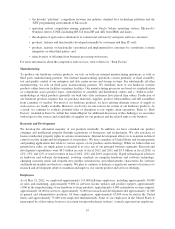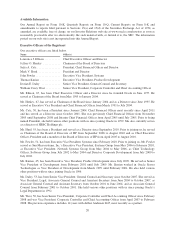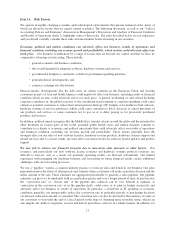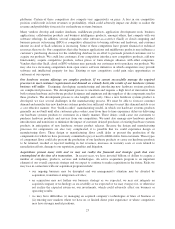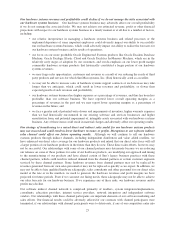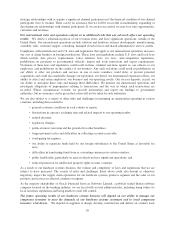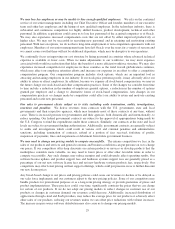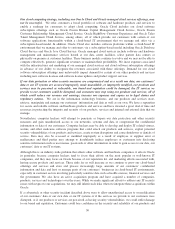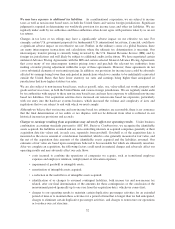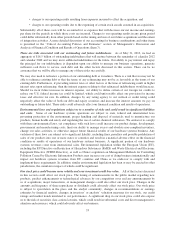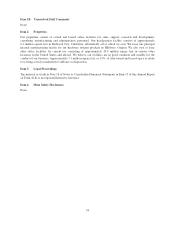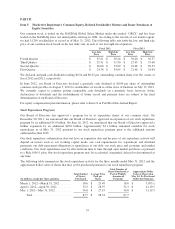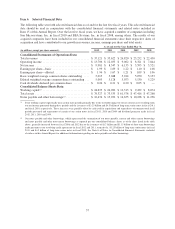Oracle 2012 Annual Report Download - page 32
Download and view the complete annual report
Please find page 32 of the 2012 Oracle annual report below. You can navigate through the pages in the report by either clicking on the pages listed below, or by using the keyword search tool below to find specific information within the annual report.charged against earnings in the period incurred. We have a program which primarily utilizes foreign currency
forward contracts to offset the risks associated with these foreign currency exposures that we may suspend from
time to time. As a part of this program, we enter into foreign currency forward contracts so that increases or
decreases in our foreign currency exposures are offset by gains or losses on the foreign currency forward
contracts in order to mitigate the risks and volatility associated with our foreign currency transaction gains or
losses. A large portion of our consolidated operations are international and we expect that we will continue to
realize gains or losses with respect to our foreign currency exposures, net of gains or losses from our foreign
currency forward contracts. For example, we will experience foreign currency gains and losses in certain
instances if it is not possible or cost effective to hedge our foreign currency exposures or should we suspend our
foreign currency forward contract program. Our ultimate realized loss or gain with respect to currency
fluctuations will generally depend on the size and type of cross-currency exposures that we enter into, the
currency exchange rates associated with these exposures and changes in those rates, whether we have entered
into foreign currency forward contracts to offset these exposures and other factors. All of these factors could
materially impact our results of operations, financial position and cash flows, the timing of which is variable and
generally outside of our control.
We may not be able to protect our intellectual property rights. We rely on copyright, trademark, patent and
trade secret laws, confidentiality procedures, controls and contractual commitments to protect our intellectual
property rights. Despite our efforts, these protections may be limited. Unauthorized third parties may try to copy
or reverse engineer portions of our products or otherwise obtain and use our intellectual property. Any patents
owned by us may be invalidated, circumvented or challenged. Any of our pending or future patent applications,
whether or not being currently challenged, may not be issued with the scope of the claims we seek, if at all. In
addition, the laws of some countries do not provide the same level of protection of our intellectual property rights
as do the laws and courts of the United States. If we cannot protect our intellectual property rights against
unauthorized copying or use, or other misappropriation, we may not remain competitive.
Third parties have claimed and, in the future, may claim infringement or misuse of intellectual property rights
and/or breach of license agreement provisions. We periodically receive notices from, or have lawsuits filed
against us by, others claiming infringement or other misuse of their intellectual property rights and/or breach of
our agreements with them. These third parties include entities that do not have the capabilities to design,
manufacture, or distribute products or services or that acquire intellectual property like patents for the sole
purpose of monetizing their acquired intellectual property through asserting claims of infringement and misuse.
We expect the number of such claims will increase as:
• we continue to acquire companies and expand into new businesses;
• the number of products and competitors in our industry segments grows;
• the use and support of third party code (including open source code) becomes more prevalent in the
industry;
• the volume of issued patents continues to increase; and
• the proliferation of non-practicing entities asserting intellectual property infringement claims increases.
Responding to any such claim, regardless of its validity, could:
• be time consuming, costly and result in litigation;
• divert management’s time and attention from developing our business;
• require us to pay monetary damages or enter into royalty and licensing agreements that we would not
normally find acceptable;
• require us to stop selling or to redesign certain of our products;
• require us to release source code to third parties, possibly under open source license terms;
• require us to satisfy indemnification obligations to our customers; or
• otherwise adversely affect our business, results of operations, financial condition or cash flows.
28



